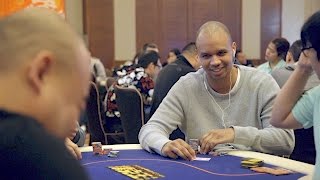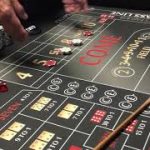Poker Tips Video Source & Information:
What is “short-deck” poker? This is just one of the things Paul Phua discusses with Phil Ivey in the latest Paul Phua Poker School video, along with strategy tips for beginners
View part one of this video here: https://youtu.be/4pmytX0Duas
Have you noticed a change in the way people are playing in Asia?
PHIL IVEY: It’s changed a lot. I think Asian players have got a lot better, and now because of all the information that’s available, with the different teaching schools and things that are available now, different ways of learning that are out there, and with Paul’s teaching site, I think everyone is catching up.
PAUL PHUA: So people nowadays… definitely beginners improve faster. It makes it a little bit harder, you know, not as easy as before to make money.
How can beginners improve their pre-flop strategy?
PHIL IVEY: I think beginners have a certain selection of hands in their minds that they want to play, and they just stick with that. But again, you’ve got to remember that beginners are usually playing against other beginners, so the strategy is a little bit different. Yes, in practice you start learning which hands you can play, in which positions, which hands you can bluff with, which hands you should call with. You know, a lot of it is trial and error in the beginning. For me it was, because again, I didn’t have schools. I didn’t have teaching sites. I didn’t have different tools I could learn from. So now I think it’s a big advantage for people coming up nowadays that they have schools that they can learn from, where they can learn which starting hands not to play, certain different pre-flop strategies, you know, things like that.
PAUL PHUA: Pre-flop, it depends on the structure of the games: whether there’s antes involved, a straddle involved, you know. You play differently for every structure pre-flop. How much dead money is there, is it worth putting in a bluff to steal however much, you know? All these factors I think are very important. And also pre-flop, whether to three-bet or four-bet a person. Like I said before, it’s more which types of players are you playing against: aggressive or tight?
How can beginners start to up their stakes?
PAUL PHUA: I think first and foremost they have to be comfortable if they want to up their ante. How many buy-ins can they afford to lose? It’s a matter more of a risk and money management thing.
PHIL IVEY: Yes, another thing is, I think that they have to be winning players at that level they are playing already. If they are not winning at that level, then they shouldn’t move up to the next level.
PAUL PHUA: Yes, definitely. To up the ante in certain games, how much of a favourite are you? What are your chances of winning in that game? It all comes into play.
What do you think of the short deck game?
PHIL IVEY: I enjoy it. I like playing it, it’s fun, it’s something different, it’s new and there’s a lot of gambling involved. The equities run pretty close, so it’s pretty easy to get your money in the middle and be 50/50 or somewhere near that. It suits a more gambling style of player.
What makes Phil such a good player?
PAUL PHUA: For me, Phil is a non-steamer, you know, he doesn’t get tilted much. He’ll play his normal game even when he’s losing, and losing big, even. I think that’s one of Phil’s greatest attributes. Phil is someone that I try to model some of my play around.
More Phil Ivey videos:
Source: YouTube








Feast
how do i play black jack
16 hour days wow
love how he says "teaching schools"